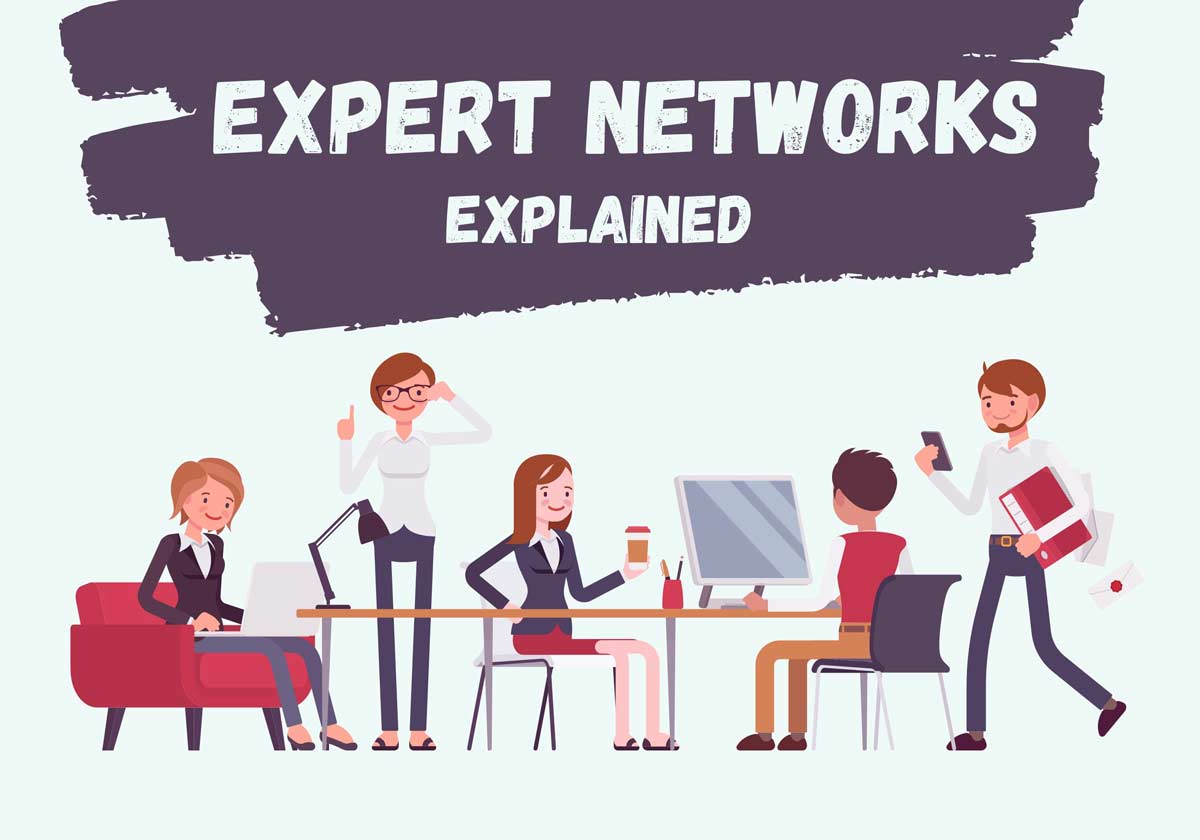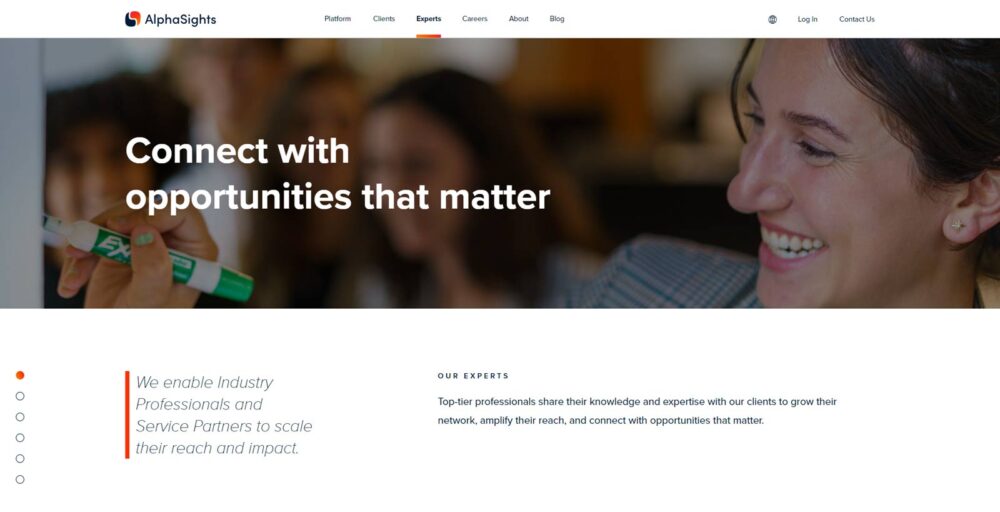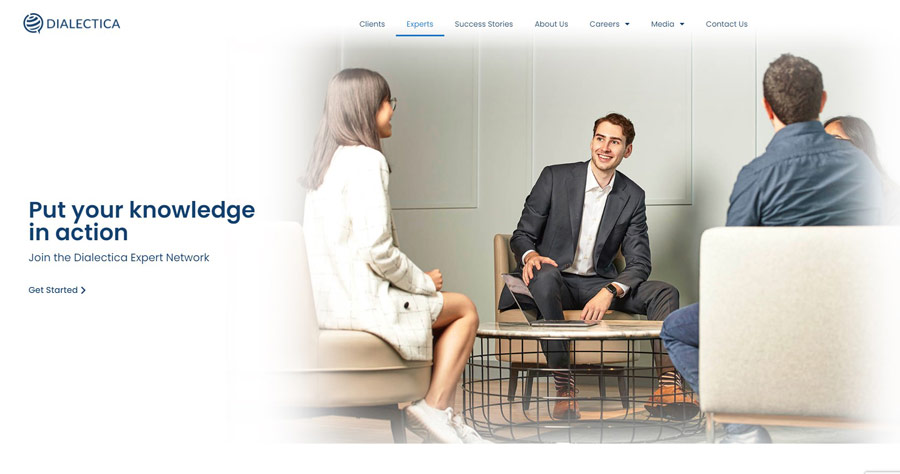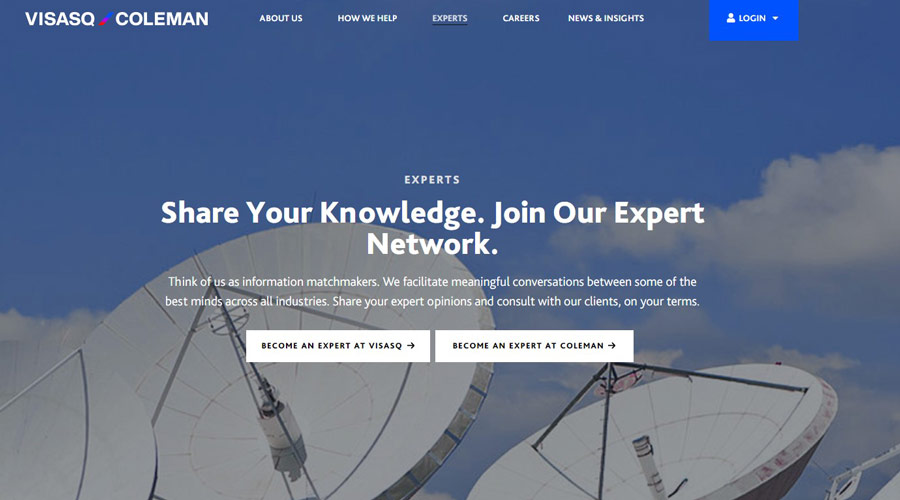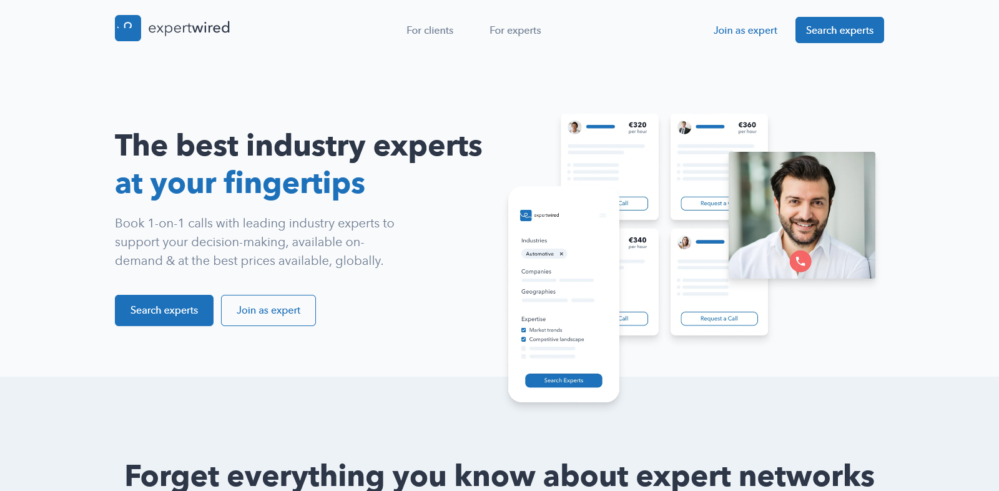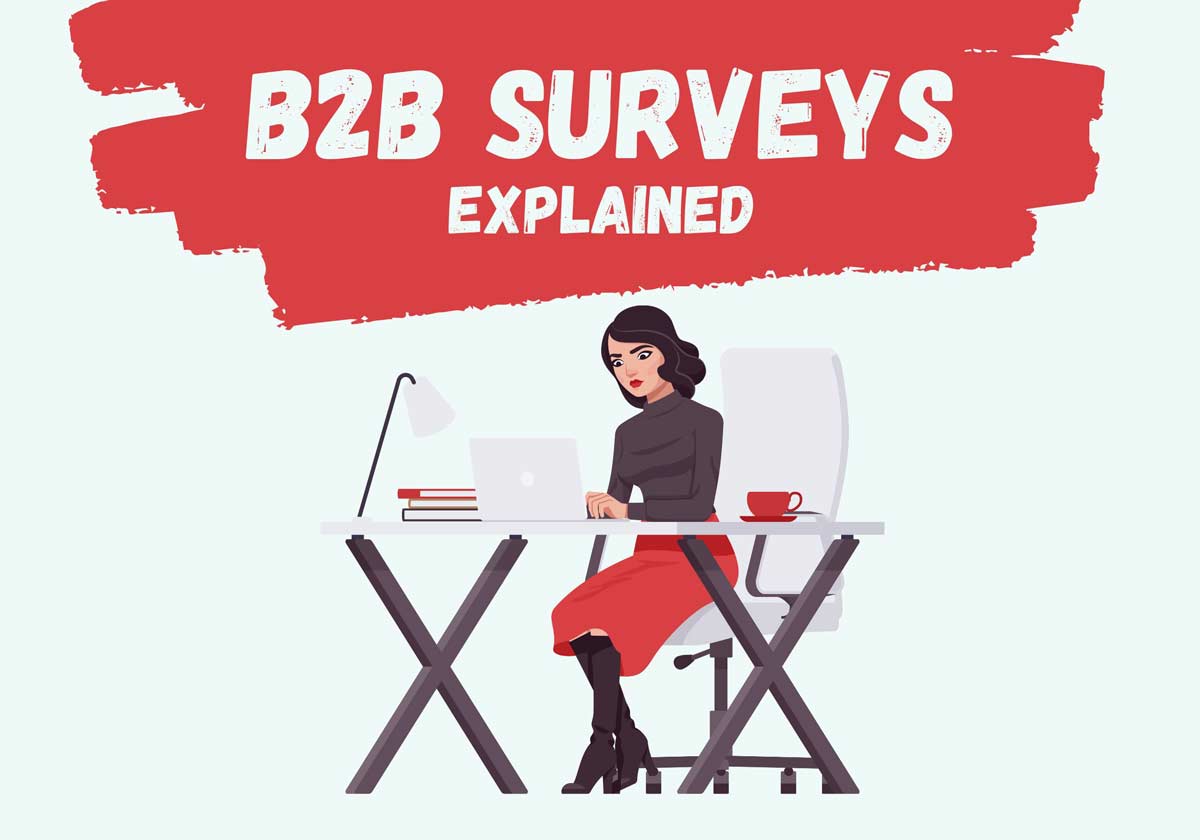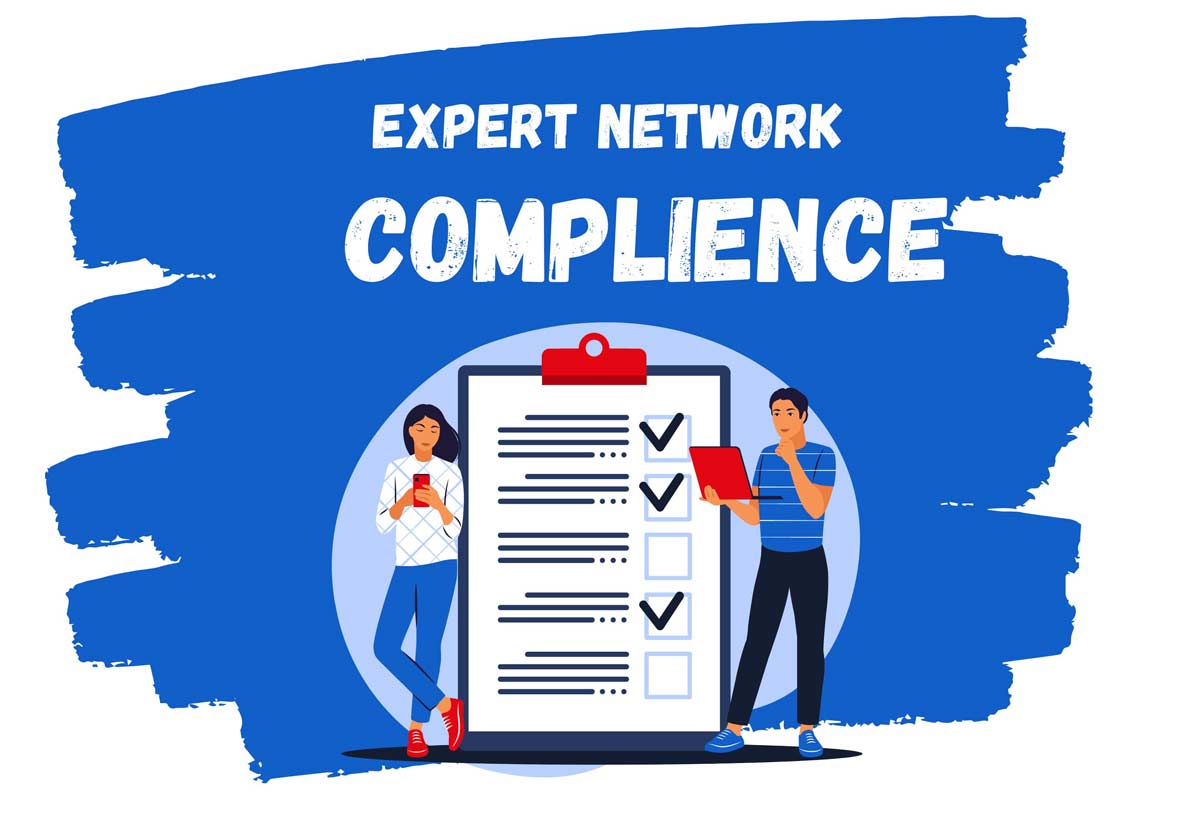Are you considering joining an expert network? You’ve come to the right place. This article will break down all the key aspects you should be aware of before accepting ad-hoc consulting jobs.
What is an expert network?
Expert network firms facilitate knowledge and insights through their access to business professionals, working on behalf of investment companies, consultancies and corporations. From the company chairpersons to the engineers specialising in offshore installations, an expert network can provide very specific knowledge from highly experienced individuals in a matter of a few days.
How do they find experts? Mainly by contacting business professionals using public information available on sites such as LinkedIn, corporate webpages and industry publications. Expert networks have large numbers of associates tasked with the job of searching, identifying and screening professionals for each project. In this way, most experts’ first experience with an expert network is to be invited through a site such as LinkedIn.
Why are companies paying for this? Clients of expert networks often seek to explore new markets, invest in high-growth companies, and refine current business strategies. By leaning on knowledge providers to find the right experts, they can close their knowledge gaps quickly and efficiently.
Sharing tacit knowledge
The knowledge clients seek from experts is tacit, which comprises experiences, intuition, insight, and skills locked up in the human mind and not widely available or accessible to others. The role of expert network providers is to find, unlock, and disperse this knowledge to those who seek it. In doing so, this knowledge becomes a key source of value creation.
Experts with unique experiences
Experts are individuals with this valuable, experience-based knowledge active across various industries, companies, and geographies. Their careers span from customers and suppliers of products to functional leadership at thousands of companies, from Fortune 100 to high-growth start-ups. Experts possess knowledge based on their unique experiences and are sought by professionals who seek that knowledge to make superior business decisions.
Types of paid opportunities with Expert Networks
As opposed to longer-term consulting jobs, expert networks typically facilitate short-term consulting gigs agreed on a case-to-case basis. The ad-hoc one-hour phone consultation model is the main type of paid opportunity, but we’ll also go through some of the other types:
- Ad-hoc phone consultations
- B2B Surveys
- In-person meetings
- Reports
- Webinars
Ad-hoc phone Consultations
These are calls between consultants and clients agreed on a case-to-case basis, where consultants share their insights and answer questions on a specific topic. Phone consultations typically last from 30 minutes to an hour and are usually paid by the minute. The hourly consulting rate can range from $100 to $500 depending on the scarcity of the information and the seniority of the expert. With most networks, it’s totally up to you as a consultant to decide how much you want to charge. We’ll cover the ad-hoc phone-based consulting process extensively further down in this article.

B2B Surveys
In addition to phone-based consultations, most expert networks facilitate online B2B research. By reaching out to their network members through email invitations, expert networks can gather data through B2B surveys from verified respondents. This is a great advantage since there are very few providers of truly verified B2B respondents. For participants the cash rewards are usually quite high, often paying as much as $50 for a 10-minute survey on a specific topic. The higher the scarcity of the target group, and the longer the survey, the higher the incentive is paid.
In-person meetings
These are face-to-face interactions between consultants and clients, where consultants offer their advice and guidance on a particular issue or challenge. In-person meetings can range from a few hours to a few days and are paid by the day or by the project. For example, a consultant who has expertise in the financial sector might be invited by a client to join a workshop or a brainstorming session on how to improve their business strategy or performance.
Reports
These are written documents that consultants prepare to deliver their analysis and recommendations on a specific subject. Reports can vary in length and complexity and are paid by the word or by the page. For instance, a consultant who has skills in the marketing field might be commissioned by a client to write a report on how to optimize their digital marketing campaign or increase their brand awareness.
Webinars
These are online presentations that consultants host or participate in to share their knowledge and expertise with a wider audience. Webinars can last from an hour to a few hours and are paid by the session or by the number of attendees. For example, a consultant who has proficiency in the education sector might be asked by a client to host or join a webinar on how to design effective online courses or enhance student engagement.

What’s the benefit for you?
Each day, hedge funds, private equity firms, strategy consultancies, and Fortune 100 conglomerates make large-scale investment decisions and strategic recommendations to the tune of billions of dollars combined.
As an expert, you can connect with individuals like these to inform them about industry insights and upgrade their thinking. In doing so, you are an active participant in the global exchange of knowledge, driving progress and innovation.
Advantages of being an expert:
- Earn consultancy rates of $100-$500 per hour
- Join dialogues with top-tier investment and business professionals around the world
- Expand your professional network and gain exposure to people, organizations, and experiences you haven’t had the chance to before
- Keep a pulse on the latest activity in your industry
- Receive remuneration, barring ineligibility, for sharing your experience via phone calls, meetings, surveys, and other interaction formats
What’s important to consider when signing up for an expert network?
- Expertise: Make sure the expert network specializes in your area of expertise. Expert networks typically focus on specific industries or fields, so it’s important to find one that matches your knowledge and experience.
- Reputation: Look for an expert network with a good reputation in the industry. Check online reviews and ratings, as well as any relevant news articles, to get a sense of the network’s track record.
- Compensation: Consider the compensation offered by the expert network. Make sure it’s competitive with other networks and takes into account your level of expertise and experience.
- Privacy: Ensure that the expert network values your privacy and has policies in place to protect your confidential information. This is especially important if you work in a sensitive industry or handle sensitive information.
- Flexibility: Look for an expert network that offers flexibility in terms of the amount of time you need to commit and the type of work you’ll be doing. Some networks may require you to be available for a certain number of hours per week, while others may allow you to work on an as-needed basis.
- Support: Check whether the expert network provides adequate support, such as training, resources, and ongoing communication. This can help you maximize your potential and be more effective in your role as an expert.
How do expert networks operate?
How do expert networks operate? Most experts operate through subscription-based business models, in which clients pay for a set number of credits at the beginning of a month or year, and then bag the difference. This model can be lucrative, but it requires a high subscriber base, which is difficult to achieve without a scalable and reliable business model. The internal operation of an expert network varies, and each has its merits.
Anyone can become a consultant
The largest expert network is the consulting industry, where big firms are rehiring former consultants to provide their expertise to corporations. Those big firms create their own expert network workflow, acting as curators between the experts and the clients. But as more SMEs and start-ups recognize the potential of expertise, the expert network industry is growing. As a result, large consultancies need to adapt. For the time being, it is likely that expert networks will continue to be a viable business model.
The importance of compliance
Compliance is critical for an expert network. These companies must ensure that their members’ compliance policies are in place and have effective tools to monitor them. Expert networks should never be complicit in insider information because they could lose their reputation. However, if you are unsure about a specific piece of information, it is okay to decline the request. If a client insists on providing non-public information, it’s not worth it.

How do they find industry experts?
Traditional expert networks rely heavily on their junior employees to find and recruit industry experts, a time-consuming process that consumes significant resources. In addition to using public information available from platforms such as LinkedIn, many expert networks build their own internal databases of previously used experts.
Scouting for the right expert
Traditional expert networks rely on scouting through a massive database of industry experts. Their team is responsible for finding the best match, and then following up with the clients over the phone. While the process is considered low-tech and resource-heavy, the largest players in the expert network industry such as GLG Insights are driving innovative changes to make the matching of experts more effective. In addition, these networks don’t have a fee structure; consultants tend to pass the cost of their services on to their clients.
How do you sign up for expert networks?
Start by making sure that your LinkedIn profile is updated and clearly targeted toward the niche you would like to share on the expert network. While many expert networks are considered “invite-only” communities, you can also reach out and submit your interest proactively. Once you have registered with a network, you must update your profile information to make sure your consultation opportunities will match your field of expertise. While the details must be accurate and detailed, it is crucial not to include any confidential information about former or current employers. This will ensure that your profile shows up in relevant search results. Once you’ve been approved by the network, you can begin taking consultations.
Which expert network is best?
When it comes to expert networks, the most common way of sharing your expertise is through one-hour telephone calls with potential clients. These calls are the bread and butter of expert networks. The main purpose of these calls is to gather input from those on the ground – competitors, customers, or former employees. Some of the other members of an expert network include government officials, doctors, and other key influencers. Here’s how to find the right match for your expertise.
Consider what you are allowed to share
The first thing to consider is how much information you are willing to disclose to clients. While you may be tempted to disclose non-public information to clients, it would be best to refrain. If you do share sensitive information, you could face permanent expulsion from the expert network. If you don’t know the answer to a client’s question, the client may consider asking you for it. In this case, err on the side of caution and tell them you don’t know.
How are the consultations organized?
Consultants engaged by Expert Networks must sign contracts that include conflict-of-interest information, and they agree to review their agreement before every consultation. Consultants who work for expert networks usually earn upwards of $100 per hour.
A good expert network consultancy requires deep expertise and thoughtful insights. As such, you must be prepared to fill out screening questionnaires and speak with staff members in order to qualify for consulting opportunities. Be careful not to rush through these questions as this can decrease your chances of getting the assignment. Once you submit your screening answers, a member of the expert network will determine if you qualify for the project, contact you and ask for availability. The consultant must then show up for each project on time and provide accurate information.

Who is using expert networks?
The consultation calls are the bread and butter of the expert network. These calls typically connect investors, former employees, competitors, customers, suppliers, and key influencers. The content is often related to the company’s product or service and may include how it works.
Widespread use of expert networks
The idea behind expert networks is simple: companies can tap into an expert’s knowledge and expertise to solve a problem for clients. Instead of asking them for a general answer, they can request a quote and call back from an expert. Many experts are also available in multiple fields. Expert networks allow organizations to focus on specific niches. A recent survey of 2,500 companies revealed that a majority of them were using expert networks to solve their problems.
A multi-billion industry
Expert networks are increasingly becoming a multi-billion dollar industry. Essentially, they connect companies with subject-matter experts and make their business more successful. Many of these companies offer expertise in a particular area and can connect them with clients within hours or days. A good expert network will also have a global reach and can serve clients across the world. The largest operators can win contracts and build a reputation for quality and integrity.
What is the hourly rate paid by expert networks?
The expert network industry has grown tremendously over the last decade. Experts from a wide range of fields have been engaged by businesses and investors. As a result, the number of expert network projects is likely to continue to rise. Bloomberg recently reported that investors are willing to pay as much as $1500 an hour to chat with an expert. This type of consulting industry is becoming a significant revenue stream for many companies.
Software powered marketplaces
While expert networks have traditionally remained opaque about their rates, a new generation of expert networks has emerged. Instead of armies of associates, the new breed of expert networks uses software-powered marketplaces to link clients with experts. Experts can sign up and apply using their profiles, and companies can pay for services that match their needs. Many expert networks have low-commitment models and offer a free trial period.
How to set your hourly rate
When setting your hourly rate, ask the expert network you’re considering joining for an average hourly rate. You can then set a lower rate and gradually increase it as your business grows. You can also set a price range that is comfortable for you. More junior experts should start by charging $100 per hour and then gradually increase the rate over time. A seasoned mid-level manager can expect $200-$400 per hour, while C-level executives would be able to charge an hourly rate of at least $500. It’s important to remember that Expert Networks charge their clients upwards of $1500 per hour which means the majority of the revenue goes to the network and not to the expert.

Who can join an expert network?
Expert networks have become a vital tool for companies and investors looking for advice. Expert calls can help companies assess their competitors and their value chain from suppliers to customers. You can participate by filling out surveys and talking to junior members of the expert network. Expert networks have a diverse list of experts from a wide range of fields and sectors.
Criteria to join
Some expert networks seed their members based on a narrow set of criteria. Other networks allow anyone to join. While it may seem intimidating and exclusive to become an expert, the word “expert” is a highly accurate description of someone who has extensive experience and knowledge in a specific field. An expert is not necessarily a PhD holder in an obscure area. They are simply professionals with a wealth of professional experience in a particular domain.
Expert Networks at a glance
Here are some key facts about the Expert Network industry:
- The expert network industry surpassed $2B in revenue in 2022.
- The largest global player in the industry is GLG Insights.
- Global runner-ups include AlphaSights, ThirdBridge and Coleman.
- Regional leaders include VQ in Japan and Liahnson & Company in Korea.
- Most networks are privately owned, except for VQ which is traded on the Tokyo Stock Exchange.
- There are more than 100 expert networks globally – you’ll find most of them on HuginX.
- The top 10 expert networks employ more than 20K people

